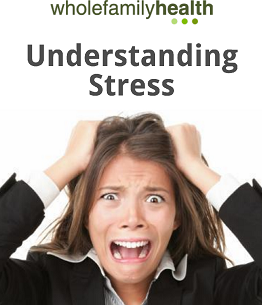Understanding Stress
Posted by Admin

To keep it simple, stress is defined as any event that threatens homeostasis (stable and constant body conditions like blood pressure and body temperature) and causes the body to adapt. This includes: external temperature, water intake, physical exertion, a car accident or even positive excitement like seeing your friend. Physiologists point out that while the reaction of the body to cold temperatures is different from its reaction to fighting an infection or to an event that causes anxiety and fear, in one respect, all of these types of stress affect the body in a similar way—they all cause an increased secretion of cortisol by the adrenal cortex. This being said, stress can be defined as any event that causes increased cortisol secretion.
Most people think of stress as the resulting factor when an event triggers a fight-or-flight response. The fight-or-flight response is a full-body reaction mediated by the sympathetic nervous system as an inborn, automatic reflex to ANY perceived danger r threat to survival. This reflex has protected mankind throughout evolution by rapidly preparing the body to respond to life-threatening situation, like an animal attack. Although this response is natural and essential to human life and adaptation, the body can’t differentiate between a hypothetical threat that might be caused by an unpaid phone bill, and a genuine threat where immediate action is required to survive, like during natural disasters or getting chased by a wild animal.
There are a few different forms of stress that the body can undergo:
– Mental: (ex): negative speculation that your boss is mad at you.
– Emotional: (ex): grief over the loss of a loved one.
– Physical: (ex): pain from a physical injury.
– Acute stress: (ex): you’re watching a scary movie and something during the movie temporarily startles you.
– Chronic stress: (ex): you are under constant stress and pressure at work and you are constantly worrying about finances and losing your job.
Experiencing any of these forms of stress is expected and a natural reaction to life events, it’s how we adapt, but we must learn ways to manage the severity of our stress. Although all of these forms of stress are not desirable, it’s the chronic stress that can be the most detrimental to our body. Chronic stress is a situation which persistent stressors repeatedly trigger the fight-or-flight response leading to prolonged elevation of cortisol and epinephrine (adrenaline). These hormones, when not used in a real emergency can wear down the body’s systems and lead to stress-related diseases like high blood pressure, heart disease, ulcers, poor immunity, and even increased aggression and defensive behavior. After a life-threatening incident, the epinephrine that has not been reabsorbed produces a shaky, nauseous, pumped-up feeling. In situations of chronic stress, epinephrine causes over-stimulation of the autonomic nervous system and adrenal exhausted associated with fatigue and mental weariness.
A body under constant stress becomes more susceptible to infections and diseases. People adapt quickly to challenging situations and may not recognize that symptoms such as insomnia, chronic tension headaches or heartburn are related to stress. If the stress is great enough like during a natural disaster the body cannot deal with this amount of stress and can result in a specific and separate condition called post-traumatic stress disorder.
As a massage therapist and acupuncturist I often see people with habitual tension patterns in muscles. For example, persistently tight shoulders and lower back are some common instances. These therapies have been proven to help reduce in the body by stimulating the parasympathetic nervous system producing a rest-and-digest response which can help with sleep, digestion and mood. Your massage therapist and acupuncturist can also give you guidance on homecare techniques to decrease stress in the body.
Contact us today for more information!
